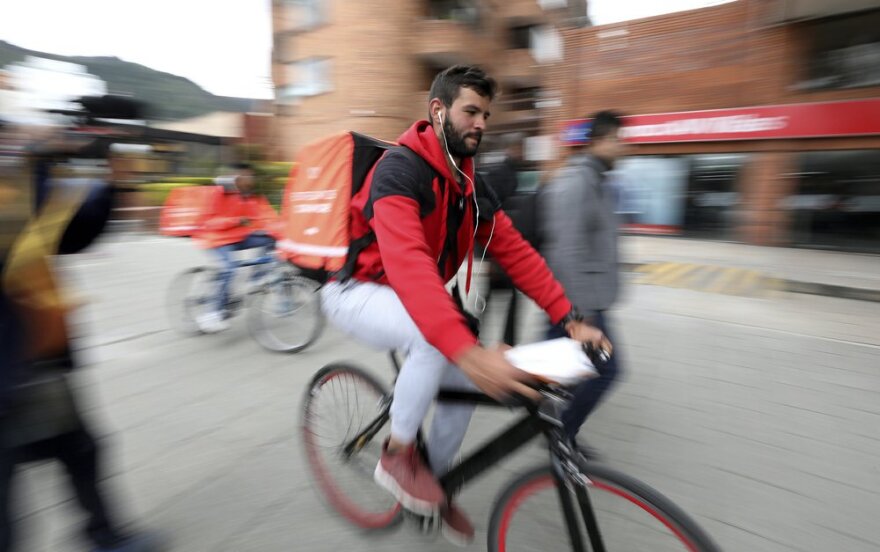A lot of the new tech energy we're feeling in Miami is being fed by the new tech energy in Latin America.
The COVID pandemic slammed Latin America’s economy harder than perhaps any region in the world. But during that time of commercial collapse, a lot of tech innovators created businesses that are helping Latin America recover post-pandemic — and they’re getting big investment bucks from Miami.
As the pandemic continues, you can rely on WLRN to keep you current on local news and information. Your support is what keeps WLRN strong. Please become a member today. Donate now. Thank you.
One is Colombian education technology startup UBITS. It creates online training courses that help companies upscale their employees' skills sets — and their incomes, which matters in a region still saddled with the world's worst economic inequality rates.
“Latin America is the region with the largest skills gap in the world," said UBITS co-founder Julián Melo.
"We want to help solve the inequality, the lack of opportunities that people have.”
Melo used to teach engineering in Bogotá. He said the idea for UBITS emerged partly from noticing that so many — maybe too many — of his university students were from the upper crust of Colombian society.
“I was just only impacting like the 0.1 percent of the population of Colombia," Melo said. "We want to impact millions of people in the whole region.”
UBITS definitely filled a regional demand. After launching its current product a few years ago, it now operates in eight Latin American countries and employs 350 people. It uses tech algorithms to find out what kind of training different Latin American workers need.

UBITS’ other founder, Marta Helena Forero, an industrial designer from Bucaramanga, Colombia, said it's especially important startups like hers get backing because "we are part of an army of creative and innovative entrepreneurs helping Latin America reach its highest potential now after COVID."
Problem is, it’s still very hard to round up enough capital in Latin America itself to fund the launch let alone the expansion of enterprises like UBITS. But those companies are finding it more and more in Miami — from investors like Francisco Alvarez-Demalde.
“An increasing number of companies from Latin America are creating a lot of disruption," said Alvarez-Demalde, who heads the tech investment firm Riverwood Capital, one of the largest investors in Latin American tech.
READ MORE: How Miami is filling the high-tech void in Latin America.
Last year Alvarez-Demalde moved from Silicon Valley to Aventura. This year he and Riverwood led a $25 million round of funding for UBITS — part of what he calls Miami-and-Latin America “connectivity.”
“More and more projects will come out of it," said Alvarez-Demalde. "That type of network effect, this is the first time I’m seeing it in Miami as I saw it New York and Silicon Valley.”
Alvarez-Demalde is from Argentina and knows all too well what a millstone Latin America’s low-tech economy is.
“The infrastructure of tomorrow for Latin America is more technology education than probably airports and highways," he said.
"You of course need airports and highways, but it’s fascinating to see what’s happening, y’know, Latin American companies that are focused on e-commerce, cybersecurity, et cetera. I get particularly excited when I see them come along.”

So does Florida University International University international business professor Jerry Haar, who recently trumpeted those startups in Latin Trade magazine.
“One of the big drivers of growth and development in Latin America is the democratization of technology," Haar told me.
He points out last year Latin America saw a record 18 tech startups reach “unicorn” status, or valuations of a billion dollars.
Among his favorites is NotCo in Chile, which uses artificial intelligence technology to determine which plant-based materials are best for creating alternatives to foods like meat and dairy.
“All the technologies that we’re seeing and experiencing here are being played around with by very creative people in Latin America and the Caribbean," said Haar.
"This is an unstoppable force.”
Tech startups are part of an army of creative and innovative entrepreneurs helping Latin America reach its highest potential now after COVID.Marta Helena Forero
Perhaps more unstoppable because more women tech entrepreneurs are in the mix — including Tatiana Pimenta, co-founder and CEO of Brazilian healthtech startup Vittude, which connects patients and psychologists. Last month it scored $7 million in venture capital — an indication Pimenta said, that her country's historically insular and male-dominated tech scene is becoming more diverse.
"Investors are seeing that tech enterprises run by women here are delivering results," Pimenta told internet channel TV Lide.
TECHXODUS
And more and more of those results in Latin America are being funded by Miami’s new tech ecosystem — where LinkedIn reported South Florida recently saw a 15% jump in the number of tech professionals moving in, the largest increase of any U.S. metropolitan area.
As that LinkedIn study suggests, tech professionals and investors are making a “techxodus” from San Francisco and New York to Miami. Miami still has a ways to go before it becomes a national tech hub. But many techies are coming because, given South Florida’s strong ties to Latin America, it’s the best place to hook up with the region’s promising startups.
“We’ve hit this inflection point where Miami has grown into an important tech movement," said Juan Pablo Cappello, an attorney at PAG Law in Miami who's also a leading figure in venture capital funding for Latin American companies.
"So if you’re an entrepreneur in Latin America, Miami becomes an extremely attractive place.”

Case in point: Three years ago, Japanese tech investment giant SoftBank, a Silicon Valley pillar, opened offices on Miami's Brickell Avenue and launched a $5 billion Latin America fund. Last fall it launched another worth $3 billion.
The SoftBank fund's first Latin American bet was an app-based, on-demand delivery service in Colombia called Rappi — which is now a unicorn.
Last year Latin American startups received $15 billion in venture capital — much of it from Miami. That’s triple the $5 billion they secured three years ago. Cappello said that infusion helped keep thousands of Latin Americans employed during the pandemic.
“Because," he said, "in Latin America the governments did not have the ability to print trillions of dollars of subsidies like businesses were given here.”
Miami has grown into an important tech movement — so if you’re an entrepreneur in Latin America, Miami becomes an extremely attractive place.Juan Pablo Cappello
That feeling of boosting Latin America’s underdogs is palpable at Miami investment firms like The Venture City. At its Buena Vista offices, founder and CEO Laura González-Estéfani — a Silicon Valley veteran — cheers her team during morning meetings as they go over the startups in their portfolio. More than a third are Latin American.
“Y’know, when I was in San Francisco," González-Estéfani said, "I realized that not always the best entrepreneurs were getting the support and the capital.”
González-Estéfani, who is originally from Spain, moved to Miami six years ago after she grew disillusioned seeing tech startup founders from regions like Latin America too often get ignored by venture capital.
“If you were a Brazilian that had no connections in the [San Francisco] Bay Area," she said, "it would be a lot more complicated for you.
"But those founders were as amazing or even more.”
The Venture City office has a large stuffed iguana with a horn on its head. That's because González-Estéfani calls Latin American startups that make their first billion “iguanacorns,” after the lizards that drop half-dead from trees during cold snaps — as iguanas famously do in South Florida — but resiliently recover.
"A lot like what Latin American startups often have to go through," she says.
She hopes "iguanacorn" is the future for Venture City-backed startups like SimpliRoute of Chile, a logistics tech company whose delivery routing system is now used across Latin America by mega-clients like WalMart. Or FinConecta, an open-banking fintech, or financial technology startup, run by Bolivia native Jorge Ruiz.
“In Latin America we used to have more fintechs from Asia, from Europe, to support financial institutions," Ruiz said. "Now we have many from Latin America.”

Ruiz is among several Latin American startup founders who live in South Florida. (Cappello notes many of them now plant about a fifth of their operations here, usually the financing end of the business, and keep the rest in Latin America.)
I met Ruiz after his Saturday morning cycling ride in Key Biscayne with fellow tech entrepreneurs and investors — who met through a WhatsApp networking group, which has grown into a public benefit company, called Miami Tech Life. It was started by Miami tech investment veteran and entrepreneur Demian Bellumio, an Argentina native.
“Y’know, it’s the decade of Latin America that is coming," Bellumio said. "I mean, it still has a lot to grow — and Miami has everything to benefit from that.”
In the past year, Miami Tech Life has grown from a dozen chat group regulars to more than 1,500 members. And Bellumio says one of their hottest topics is ... Latin America.



